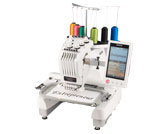PR655/PR655C
FAQs & Troubleshooting |
Why does the upper thread keep breaking?
There could be several reasons why the upper thread keeps breaking.

-
The upper thread could be installed incorrectly.
Rethread the machine according to the instructions.For details, refer to "Upper threading".
-
The upper thread tension could be set too tight.
Set the tension to the best thread tension setting or less.
-
Make sure the spool of thread is installed correctly using the correct size spool cap for the size of spool.
For details, refer to "Place a spool of thread on a spool pin".
-
Make sure the needle is correctly inserted with the flat side facing the back and pushed up into the machine as far as possible.
-
The needle could have been damaged or bent.
If so, replace with a new one.
-
The lower thread tension is incorrect.
The thread does not roll out of the bobbin case smoothly.
Adjust the lower thread tension.
-
The bobbin thread is not wound correctly.
Check that the bobbin is wound so that it about 80% full and that the thread is evenly wound.
If the bobbin is not correctly wound, rewind the bobbin.
-
The thread density of the embroidery data is too fine.
Three or more overlapping stitches are being sewn.
Using a data design system, correct the thread density and overstitching settings in the embroidery data.
-
The embroidery data contains stitches with a pitch of zero.
Delete all stitches with a zero pitch.
-
The embroidery data contains many stitches with an extremely small pitch.
Delete all stitches with a small pitch.
-
The fabric is not taut.
Firmly set the fabric in the embroidery frame so that it is taut.
-
The thread is loose in the hook area or the hook does not rotate smoothly.
Remove the loose thread.
-
The thread quality is poor.
The thread quality is too weak due to age of thread.
Replace thread.
Remove any knots or tangles.
-
A bobbin designed specifically for this machine is not used.
Be sure to use the correct bobbin. -
Needle and thread are incorrect.
Be sure to use the correct thread and embroidery needle.
* In the cases shown below, consult nearest authorized Dealer or Service Center.
-
The area around the hole in the needle plate is damaged.
-
The needle hits/touches the needle plate.
-
The presser foot is set too high and not correctly positioned. The needle hits/touches the presser foot.
-
The area around the embroidery foot hole is damaged.
-
Sliding surface on hook race is not smooth.
There are scratches or burrs on it.
-
The play between the hook and the race is too much.
-
The space between the hook stopper and the hook cannot be adjusted.
- The automatic needle-threading mechanism is broken.
Content Feedback
To help us improve our support, please provide your feedback below.
